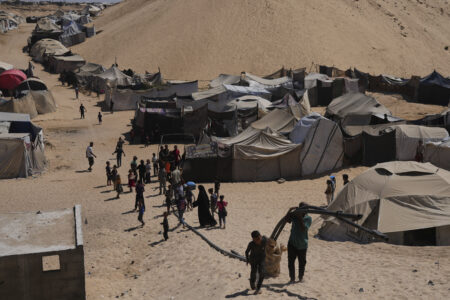As UN climate talks loom in Brazil, many fear they can’t afford to attend
Pooja Tilvawala knows it’s a gamble to use more than $46,000 of her own savings to help young people get to the United Nations climate summit in Brazil.
But she thinks it’s a necessary one.
As national delegations, activists and other attendees struggle to find affordable places to stay by November, with some deciding not to go at all, Tilvawala, who lives in London, has spent hours working from afar to find lodging in Belem, negotiate prices and contracts and put down deposits.
She did all that to create a housing portal specifically for young people who want to be part of the international conference. If not enough people sign up for the housing she’s secured, she might lose some of what she’s put down.
“There’s always a huge number of fossil fuel company representatives there. And who’s going to be there to combat those voices and those negotiating influences?” said Tilvawala, founder and executive director of the global organization Youth Climate Collaborative. “So I was like, ‘We need to be here.'”
With less than two months before this year’s Conference of the Parties, or COP30, only about 36 percent of the 196 participating countries have confirmed attendance and paid for accommodations, according to a spokesperson for the conference presidency.
Activists and poorer nations are feeling the crunch as hotel prices have skyrocketed and even private homes, love motels and other makeshift accommodation options are charging a minimum of several hundred dollars a night.
The Brazilian government chose Belem because it’s part of the Amazon and to underscore the problems common to growing cities in the developing world, but some prospective attendees are raising questions about how productive the talks will be if they are overshadowed by a big drop in attendance.
Many haven’t confirmed housing yet, and the
pressure is on
The Brazilian government has taken steps to address the problem. Climate Minister Marina Silva said 10 to 20 rooms have been made available “at accessible prices” for vulnerable countries. The government has also brought in two large cruise ships that can house as many as 6,000 people.
“Everybody will have access to participate in COP30,” Silva said at a recent press briefing. “Facing climate change must be done by all of us, by all the parties of the convention and especially by those who are already living the consequences of climate change.”
But U.N. Climate Change executive secretary Simon Stiell sent a letter on Sept. 9 asking that agencies in the U.N. system, and related organizations, review how many people they’re sending to COP30 and reduce it where possible.
To add to the pressure, a construction workers’ strike started Sept. 15 and includes areas being worked on for COP30.
A challenge for a city chosen to illustrate climate realities
Belem was initially excited to host the conference, said Arnaldo Vaz Neto, a Brazilian financial adviser who has been working with an organization called the Young Scholars Initiative as an intermediary between locals and COP30 visitors seeking housing. “It’s kind of taught in our childhood to have this behavior of hospitality,” he said.
But that was followed by the realization that the United Nations had high international standards for its guests. It was difficult to manage expectations on both sides, Vaz Neto said.
Belem isn’t the only city hosting a U.N. climate conference where lodging rates have gone far higher than usual. Silva said it’s happened at nearly all such conferences, with prices three or even four times market rates.
“A lot of people here are expecting to charge $1,000 a night but that’s beyond the average,” Hugo Pinheiro, a secretary who works for K Pine Mobile in Belem, and has worked to match delegations with housing and to negotiate on prices.
The “accessible” rooms made available by the Brazilian government will rent for between $200 and $600 a night, according to a COP30 presidency spokesperson.
Brazilian officials have expressed confidence that all 196 nations will find housing and come to Belem. In a statement, the presidency said it expects 50,000 participants and Belem currently offers 53,000 beds. That’s fewer people than recent COPs, even though the Brazil meeting is considered one of the most important negotiations in years because countries have to update and strengthen their carbon pollution plans.




